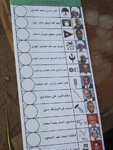
Domestic and international observers issued their initial statements on Sudan’s elections over the weekend, with general consensus that the elections did not meet international standards.
A coalition of Sudanese civil society organizations, which deployed around 3,500 independent local observers throughout North Sudan, called for the “reorganization of real elections” and attributed the election’s many technical failures to the National Election Commission, or NEC, the body charged with managing the exercise and whose neutrality has come into question.
“The overarching theme of the current elections is one of severe moral and professional failure by the NEC which impaired it to manage fair and free elections. This failure happened despite the fact that the Commission is sitting on huge financial resources never granted to an elections management body in the history of the country. For all these reasons, we believe that the voters of Sudan were unable to freely express their will and select their representatives.”
In their preliminary statements, both the U.S.-based Carter Center and the European Union observation mission noted an environment in which political freedom and rights were severely circumscribed due to legal and political obstructions, as well as ongoing insecurity and violence, especially in Darfur. The E.U. Mission, comprised of 134 observers, noted that the administration of 30 percent of polls was marred by noticeable disruption. “These elections have struggled to reach international standards. They have not reached them at all,” said the head of the mission to reporters on Saturday.
The Carter Center, which started monitoring in late 2009 and deployed over 70 observers, also detailed the many logistical challenges and delays, including confusion over voter registry lists, mistakes with ballots, lack of transparency over the voter identification process, and the manipulation of illiterate voters, that hampered the elections’ potential. The center said in its statement:
“While it is too early to offer a final overall assessment, it is apparent that the elections will fall short of meeting international standards and Sudan’s obligations for genuine elections in many respects."
The use of intimidation and force against polling staff, observers, candidates and voters, which the Carter Center said was “locally motivated, rather than centrally controlled,” was also of concern. Southern army soldiers were particularly visible in polling stations in parts of the South.
Other, smaller, monitoring missions on the ground disagreed with these assessments. The African Union, which deployed about 50 observers, said in its statement that polls “afforded the majority of the Sudanese citizens to exercise their civic and democratic rights by electing representatives of their choice for the first time in 24 years.” A spokesman for the mission said to Sudan Tribune, “We have not found evidence of fraud… we saw a vote that was very transparent.”
Similarly, the Intergovernmental Authority on Development’s 37-person mission, or IGAD called the process “credible,” saying that this preliminary assessment was “in view of promoting a peaceful and democratic transformation of the country.”
In a press conference on Sunday, the Arab League mission said of Sudan’s polls: "The elections did not meet international standards but they are a big step forward compared to other countries in the region."
Photo: Election ballot. (Maggie Fick)

